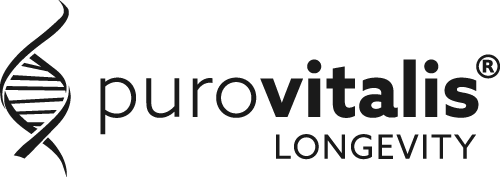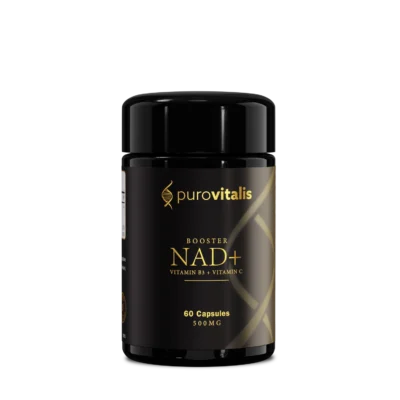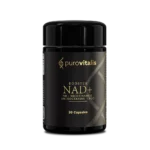
In this article, we break down the role of NAD+ in simple terms, exploring how it fuels energy production, supports DNA repair, and impacts aging. Learn how to naturally boost NAD+ levels, understand its connection to longevity, and discover why maintaining healthy levels is essential for overall well-being.
Key takeaways:
- NAD+ in cellular health NAD+ is crucial for several key functions in the body. It’s essential for making energy, repairing DNA, and maintaining the health of the brain, heart, and immune system.
- Boosting NAD+ naturally You can increase NAD+ levels naturally by exercising, fasting, eating foods rich in NAD+ precursors (like NR and NMN), and protecting your skin from the sun.
- NAD+ and aging NAD+ plays a significant role in activating sirtuins, a group of proteins that help regulate aging and reduce the decline associated with getting older. This makes NAD+ very important in managing the aging process and maintaining overall health as we age.
What is NAD+?
NAD+, a vital coenzyme found in every cell, is crucial for various biological processes, including energy metabolism, DNA repair, and cell signaling. Its role extends from converting nutrients into energy to repairing damaged DNA, making it indispensable for maintaining cellular health.
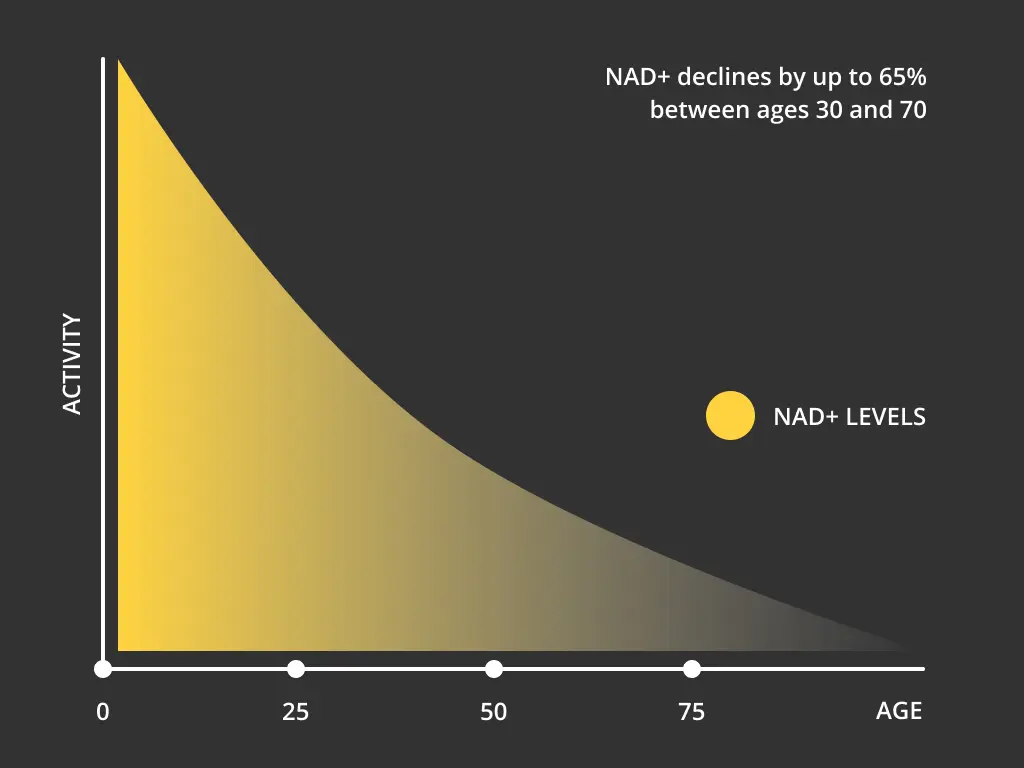
Discovery of NAD+
The journey of NAD+ began in 1906 with British biochemists Arthur Harden and William John Young. Their exploration into yeast fermentation led to the discovery of this vital coenzyme. This breakthrough initiated a century of research, revealing NAD+’s central role in metabolism and cellular processes.
The benefits of NAD+
A catalyst for cellular health
NAD+ is a vital molecule for health and longevity, playing a key role in energy production and cellular repair. It helps convert food into energy, supporting a healthy metabolism and sustained vitality. Additionally, NAD+ is essential for DNA repair, protecting cells from damage caused by aging and environmental factors like pollution. Whether from air, water, or other sources, pollution introduces harmful substances that accelerate cellular damage and contribute to oxidative stress. By maintaining DNA stability and supporting cellular resilience, NAD+ helps counter these effects, promoting overall health and longevity.
Related: Microplastics health impact and prevention strategies
Beyond basic functions: Broader health implications
The benefits of NAD+ extend beyond basic cellular functions. It has been linked to improved brain health[1] . With studies suggesting that higher levels of NAD+ can enhance cognitive function and may even offer protective effects against neurodegenerative diseases. In the realm of cardiovascular health. NAD+ is found to support heart muscle function and may reduce the risk of heart-related issues. Additionally, there is growing evidence that NAD+ can play a role in supporting the immune system, helping the body to efficiently respond to infections and inflammation.
How does NAD+ help reduce the risk of cardiovascular issues?
NAD+ helps reduce the risk of cardiovascular issues by preserving cellular function and controlling the heart’s inflammatory response[2]. Abnormal inflammation can hasten the heart failure process, and NAD+ plays a role in regulating this response. By maintaining NAD+ levels, immune cells can effectively regulate the inflammatory process and reduce the risk of cardiovascular issues.
What are the potential benefits of maintaining healthy NAD+ levels?
Maintaining healthy NAD+ levels can potentially prevent inflammation, improve metabolism, boost immunity, prevent brain degeneration, and address other age-related issues[3,4]. It provides the energy needed for sirtuins to keep up with cell repair and function regulation, ultimately improving the quality of life and potentially extending lifespan.
Read also: Clinical research reveals: NMN’s effect on metabolism
NAD+ levels and aging
As we age, NAD+ levels naturally decline, leading to decreased cellular function and increased susceptibility to age-related diseases. This decline is believed to be a key contributor to the aging process. With studies showing a direct correlation between lowered NAD+ levels and age-related cellular decline.
“The loss of NAD as we age, and the resulting decline in sirtuin activity, is thought to be a primary reason our bodies develop diseases when we are old but not when we are young.”
– David A. Sinclair, Lifespan: Why We Age—and Why We Don’t Have To
Why do levels decline with age?
NAD+ levels decline with age for several reasons. One of the main reasons is due to changes in metabolism and nutrient absorption that occur as we get older. With aging, our bodies’ efficiency in absorbing and utilizing essential nutrients, including those responsible for NAD+ synthesis, decreases. Additionally, exposure to environmental stressors, such as oxidative stress and inflammation, can also lead to a decline. Furthermore, lifestyle factors, such as poor diet, lack of physical activity, and chronic stress, can also contribute to the decline with age. These factors, combined with normal aging processes, can lead to a significant decrease in NAD+ levels and negatively impact cellular metabolism, gene expression, and overall health.
To measure the NAD+ levels in your body, you can use an NAD level test kit. This blood test offers important insights into your cellular metabolism and overall health.
What is the role of the CD38 molecule in NAD+ decline with age?
The CD38 molecule is an enzyme that directly degrades NAD+. As we age, CD38 levels increase, leading to a significant drop in NAD+ levels. This enzyme plays a major role in NAD+ depletion over time.
CD38 is an enzyme that breaks down NAD+, a molecule that helps our cells produce energy and stay healthy. As we get older, CD38 levels go up, causing a steady drop in NAD+. This happens because CD38 is more active in certain immune cells that increase with age, leading to more inflammation in the body—a process sometimes called “inflammaging.”
Since NAD+ is important for energy production and keeping our cells working properly, losing too much of it can affect metabolism, mitochondria, and overall health. Some research suggests that blocking CD38 or lowering its activity could help keep NAD+ levels higher[5]. Certain natural compounds, like quercetin and apigenin, may help slow down CD38 and support healthy aging.
Related: Understanding inflamm-aging: Age and inflammation
What are the specific unhealthy habits that can cause a decrease in NAD+ levels?
Unhealthy habits such as smoking, heavy alcohol intake, poor diet, lack of exercise, and UV exposure can cause a decrease in NAD+ levels.
Related: Epigenetic aging: How do lifestyle and health-related exposures contribute to it
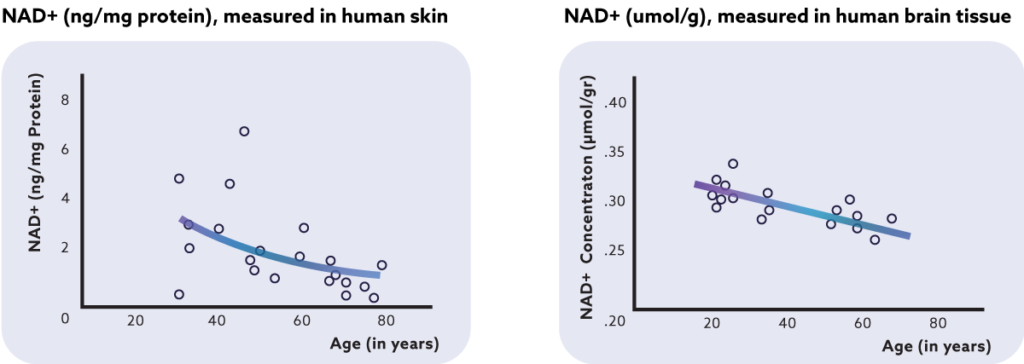
Also interesting: Top 11 longevity hacks backed by science
Natural ways to increase NAD+ levels
Increase NAD+ levels naturally
Exercise: Regular physical activity not only promotes overall well-being but also stimulates NAD+ production. Research indicates that exercise boosts the expression of key enzymes responsible for NAD+ synthesis, supporting cellular energy and repair.
Fasting: Practicing intermittent fasting activates metabolic processes that naturally elevate NAD+ levels. This enhances cellular function, supports longevity, and strengthens the body’s resilience against aging.
Dietary choices: Eating foods rich in NAD+ precursors—such as dairy, fish, and certain vegetables—helps sustain healthy NAD+ levels. These nutrients provide the building blocks needed for efficient cellular metabolism and repair.
Sun protection: Overexposure to UV radiation can deplete NAD+ levels, accelerating cellular damage. Protecting your skin from excessive sunlight is a simple yet effective way to maintain NAD+ and support long-term skin health.
You may also like our top 9 exercises for longevity.
Increasing NAD+ with precursor supplements
To increase the body’s production of NAD+, supplements like Nicotinamide Riboside (NR) and Nicotinamide Mononucleotide (NMN) can be very helpful. When taken, these compounds turn into NAD+ in the body, providing a straightforward way to raise the levels of this important molecule. NR is especially effective because it can skip some steps in the process of making NAD+, making it a potent option. Similarly, NMN is a direct building block for NAD+. Research has shown that taking NMN supplements can significantly raise NAD+ levels, which is good for overall health, energy use in the body, and may even help people live longer.
Can NAD+ supplementation reverse the aging process?
Scientists have conducted extensive research[5]on the potential of NAD+ supplementation in reversing the aging process. Based on the gathered data, many scientists firmly believe that restoring healthy NAD+ levels can effectively invigorate the body’s cellular functions, leading to a significant reversal of aging. This has positioned NAD+ as a leading candidate in the quest for an anti-aging pill that could revolutionize our approach to aging.
NAD+ plays a crucial role in providing the necessary fuel for the body to maintain a healthy state. A deficiency in NAD+ levels is essentially a deficiency in the fundamental energy source required for optimal bodily functions. Recognizing this, scientists are exploring various NAD+ boosting treatments as a promising near-future solution to combat multiple issues associated with aging.
Currently, small-scale human trials [6] are underway to test the effectiveness of NAD+ supplementation. These trials hold great promise, and if successful, they could pave the way for more extensive human studies. The ultimate goal is to establish NAD+ supplementation as a natural regeneration therapy, harnessing the power of this vital molecule to maximize cellular health and combat the effects of aging.
Safety and considerations: Can NAD be harmful?
NAD+ is a natural and essential molecule in the body, but it’s important to be cautious about supplementing it. Especially when using precursors like NR (Nicotinamide Riboside) and NMN (Nicotinamide Mononucleotide). Generally, NAD+ and its precursors are safe and tolerated well when taken in recommended amounts[7]. However, there can be side effects or interactions, especially if taken in high doses or with certain medicines. Some research indicates that too much NAD+ might affect certain cell functions in ways we don’t fully understand yet, highlighting the need for more study in this area. So, it’s very important for anyone thinking about using NAD+ supplements to talk to a healthcare professional first, especially if they already have health issues or are on other medications. This is to make sure the NAD+ supplementation is safe and suits their specific health needs and situation.
NAD+ and sirtuins: Partners in cellular regulation
The synergistic relationship
The relationship between NAD+ and sirtuins is a perfect example of synergy in biological processes. NAD+ and sirtuins, especially SIRT1, work closely together, with NAD+ playing a crucial role in activating these enzymes. Sirtuins are involved in essential cell functions such as managing aging, controlling inflammation, and helping the body resist stress.
NAD+ essentially acts as a power source for sirtuins, allowing them to effectively carry out their roles in regulating various cellular activities. This partnership is particularly important in the context of aging and longevity. Sirtuins are known to have a significant impact on the aging process and are linked to age-related diseases. By supporting sirtuin activity, NAD+ contributes to managing the aging process and potentially reducing the risk of age-associated health issues. This demonstrates how the interplay between different biological components, like NAD+ and sirtuins, can have a profound impact on overall health and lifespan.
Implications for health and aging
As we age, NAD+ levels naturally decline. This decrease affects not just the energy levels in cells but also reduces the ability of sirtuins to regulate cell functions. This weakened regulatory capacity is a significant factor in the aging process and contributes to the development of age-related diseases. The decline in NAD+ and its impact on sirtuins can lead to problems with how cells metabolize energy, repair their DNA, and manage stress, which are all vital for healthy aging. Therefore, maintaining NAD+ levels might be a key strategy in promoting healthier aging and potentially reducing the risk of age-associated diseases.
How does NAD+ play a role in mitochondrial energy generation?
NAD+ is crucial in mitochondrial energy production, serving as a key molecule in cellular respiration, where it acts as an electron carrier. During cellular respiration, mitochondria break down glucose into adenosine triphosphate (ATP), the primary cellular energy source. NAD+ assists in this process by transferring electrons from glucose breakdown, converting to NADH (nicotinamide adenine dinucleotide hydride).
The conversion from NAD+ to NADH and back is vital for energy generation. NADH transfers electrons to the mitochondrial electron transport chain, creating a gradient that drives ATP synthesis through oxidative phosphorylation. The regeneration of NAD+ from NADH ensures a continuous supply of electron carriers, essential for sustained ATP production and efficient cellular respiration.
What is the future of NAD+ in medicine and research?
The future of NAD+ in medicine and research holds great promise in reversing the aging process and rejuvenating cellular functions. Scientists have conducted extensive research, indicating that restoring healthy NAD+ levels could significantly contribute to combating the effects of aging. This has led to NAD+ being considered a strong candidate for the development of future anti-aging pills.
To further understand the mechanisms of NAD+ precursors in the human body, researchers are actively exploring their therapeutic capabilities through animal experimentation. While such studies are crucial to validate the effects at the organism level, it is also essential to gather more human data. Fortunately, a recent clinical study in Japan demonstrated the safety and tolerability of NAD+ at the dose used, paving the way for future research and human trials.
The potential of NAD+ boosting treatments to address a wide range of age-related issues is a promising prospect on the horizon. These treatments are currently undergoing small-scale human trials and are anticipated to progress into more extensive human studies. With its potential as a natural regeneration therapy, NAD+ can provide a means to power up cells during a healthy state, making it a significant area of interest for future medical applications.
As research continues and more knowledge is gained about this fascinating and adaptable chemical, the future of NAD+ in medicine looks bright. By harnessing its regenerative capabilities, NAD+ has the potential to revolutionize the field of anti-aging and contribute to overall health and well-being.
Conclusion
Embracing a lifestyle that supports NAD+ levels can profoundly impact health and longevity. Whether through diet, exercise, or supplementation, optimizing NAD+ levels offers a pathway to enhanced well-being and graceful aging.
Read also this human study from Andrea Maier and colleagues, which reports remarkable results on NMN supplementation’s effects on NAD+ levels and healthy aging:
Study: Efficacy and Safety of NMN Supplementation in Healthy Middle-Aged Adults
References
- Coenzyme nicotinamide adenine dinucleotide: new therapeutic approach for improving dementia of the Alzheimer type
- The effects of nicotinamide adenine dinucleotide in cardiovascular diseases: Molecular mechanisms, roles and therapeutic potential
- Effects of NAD+ precursor supplementation on glucose and lipid metabolism in humans: a meta-analysis
- Effects of Nicotinamide Mononucleotide on Glucose and Lipid Metabolism in Adults: A Systematic Review and Meta-analysis of Randomised Controlled Trials
- Flavonoid Apigenin Is an Inhibitor of the NAD+ase CD38: Implications for Cellular NAD+ Metabolism, Protein Acetylation, and Treatment of Metabolic Syndrome
- Therapeutic potential of boosting NAD+ in aging and age-related diseases
- Clinical Evidence for Targeting NAD Therapeutically
- The efficacy and safety of β-nicotinamide mononucleotide (NMN) supplementation in healthy middle-aged adults: a randomized, multicenter, double-blind, placebo-controlled, parallel-group, dose-dependent clinical trial
Other studies used:
- Study on exercise and NAD+ production
- Research on the effects of fasting on NAD+ levels
- Study linking NAD+ levels to aging
- Research on NAD+ precursors
- https://www.sciencedirect.com/science/article/abs/pii/S0026049521002237
- https://www.ncbi.nlm.nih.gov/pmc/articles/PMC8747183/
- https://www.sciencedirect.com/science/article/pii/S2468501118300063
- https://onlinelibrary.wiley.com/doi/full/10.1111/apha.13921
- https://www.ncbi.nlm.nih.gov/pmc/articles/PMC9734213/
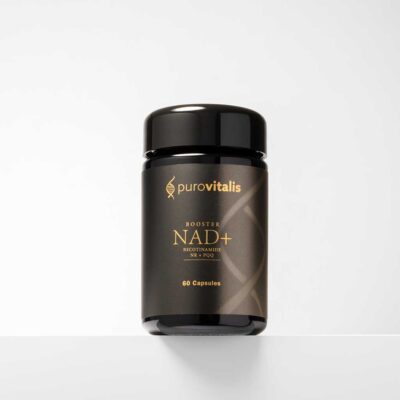
Boost Your NAD Levels Now
Discover our premium NAD+ booster and enhance your vitality.

Track 50+ health metrics with AI-powered accuracy. Start your free trial today and take control of your wellness journey!


